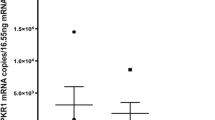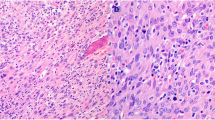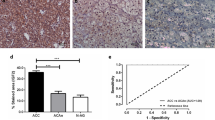Abstract
Objective
The aim of this study was to determine the correlation between human adrenocortical carcinoma and the proteins involved in tumor angiogenesis, and to evaluate the angiogenic status of adrenocortical carcinoma.
Methods
The expression of signal transducer and activator of transcription 3 and insulin-like growth factor 2 as well as microvessel density was measured in a series of tissue samples from 44 human sporadic adrenocortical tumors by immunohistochemistry. These specimens were classified as adenomas (n = 20) and carcinomas (n = 24) according to the histological criteria defined by Weiss.
Results
A total of 19 of 24 (79.17 %) malignant cases showed positive staining for signal transducer and activator of transcription 3 and 4 of 20 (20.00 %) benign cases showed positive, the difference of signal transducer and activator of transcription 3 expression between adrenocortical adenomas and adrenocortical carcinomas was statistically significant (P < 0.001). Similarly, insulin-like growth factor 2 staining was seen in 70.83 % (17/24) of the malignant cases versus 25.00 % (5/20) of the benign, the difference of insulin-like growth factor 2 expression among two groups was statistically significant (P = 0.002). Malignant cases showed higher microvessel density compared to benign tumors (84.70 ± 12.44 vs 21.05 ± 8.07, P < 0.001). Signal transducer and activator of transcription 3 and insulin-like growth factor 2 expression were positively correlated with microvessel density in all specimens (r_s = 0.832, P < 0.001; r_s = 0.703, P = 0.001).
Conclusions
This study has confirmed that adrenocortical carcinoma overexpress signal transducer and activator of transcription 3 and insulin-like growth factor 2; these results suggest that angiogenesis of human adrenocortical carcinoma may be mediated by these proteins and they could represent selective targets for the molecularly targeted treatments of adrenocortical carcinoma.



Similar content being viewed by others
References
Bovio S, Cataldi A, Reimondo G, Sperone P, Novello S, Berruti A. Prevalence of adrenal incidentaloma in a contemporary computerized tomography series. J Endocrinol Invest. 2006;29:298–302.
Golden SH, Robinson KA, Saldanha I, Anton B, Ladenson PW. Clinical review: Prevalence and incidence of endocrine and metabolic disorders in the United States: a comprehensive review. J Clin Endocrinol Metab. 2009;94:1853–78.
Allolio B, Fassnacht M. Clinical review: Adrenocortical carcinoma: clinical update. J Clin Endocrinol Metab. 2006;91:2027–37.
Fassnacht M, Libe R, Kroiss M, Allolio B. Adrenocortical carcinoma: a clinician’s update. Nat Rev Endocrinol. 2011;7:323–35.
Abiven G, Coste J, Groussin L, Anract P, Tissier F, Legmann P, et al. Clinical and biological features in the prognosis of adrenocortical cancer: poor outcome of cortisol-secreting tumors in a series of 202 consecutive patients. J Clin Endocrinol Metab. 2006;91:2650–5.
Schteingart DE, Doherty GM, Gauger PG, Giordano TJ, Hammer GD, Korobkin M, et al. Management of patients with adrenal cancer: recommendations of an international consensus conference. Endocr Relat Cancer. 2005;12:667–80.
Bromberg J. Stat proteins and oncogenesis. J Clin Invest. 2002;109:1139–42.
Bowman T, Garcia R, Turkson J, Jove R. STATs in oncogenesis. Oncogene. 2000;19:2474–88.
Chen Z, Han ZC. STAT3: a critical transcription activator in angiogenesis. Med Res Rev. 2008;28:185–200.
Weidner N. Intratumor microvessel density as a prognostic factor in cancer. Am J Pathol. 1995;147:9–19.
Wortmann S, Quinkler M, Ritter C, Kroiss M, Johanssen S, Hahner S, et al. Bevacizumab plus capecitabine as a salvage therapy in advanced adrenocortical carcinoma. Eur J Endocrinol. 2010;162:349–56.
Kouyama R, Hiraishi K, Sugiyama T, Izumiyama H, Yoshimoto T, Akashi T, et al. Clinicopathological features, biochemical and molecular markers in 5 patients with adrenocortical carcinoma. Endocr J. 2011;58:527–34.
Zhu Y, He HC, Yuan F, Zhang J, Rui WB, Zhao JP, et al. Heparanase-1 and cyclooxygenase-2: prognostic indicators of malignancy in pheochromocytomas. Endocrine. 2010;38:93–9.
Fassnacht M, Terzolo M, Allolio B, Baudin E, Haak H, Berruti A, et al. Combination chemotherapy in advanced adrenocortical carcinoma. N Engl J Med. 2012;366:2189–97.
Fassnacht M, Johanssen S, Quinkler M, Bucsky P, Willenberg HS, Beuschlein F, et al. Limited prognostic value of the 2004 International Union Against Cancer staging classification for adrenocortical carcinoma: proposal for a revised TNM Classification. Cancer. 2009;115:243–50.
Kirschner LS. The next generation of therapies for adrenocortical cancers. Trends Endocrinol Metab. 2012;23:343–50.
Folkman J. Fundamental concepts of the angiogenic process. Curr Mol Med. 2003;3:643–51.
Xu YZ, Zhu Y, Shen ZJ, Sheng JY, He HC, Ma G, et al. Significance of heparanase-1 and vascular endothelial growth factor in adrenocortical carcinoma angiogenesis: potential for therapy. Endocrine. 2011;40:445–51.
Doghman M, Axelson M, Lalli E. Potent inhibitory effect of the cyclolignan picropodophyllin (PPP) on human adrenocortical carcinoma cells proliferation. Am J Cancer Res. 2011;1:356–61.
Samani AA, Yakar S, LeRoith D, Brodt P. The role of the IGF system in cancer growth and metastasis: overview and recent insights. Endocr Rev. 2007;28:20–47.
Gicquel C, Bertagna X, Gaston V, Coste J, Louvel A, Baudin E, et al. Molecular markers and long-term recurrences in a large cohort of patients with sporadic adrenocortical tumors. Cancer Res. 2001;61:6762–7.
Piecewicz SM, Pandey A, Roy B, Xiang SH, Zetter BR, Sengupta S. Insulin-like growth factors promote vasculogenesis in embryonic stem cells. PLoS ONE. 2012;7:e32191.
Lee OH, Bae SK, Bae MH, Lee YM, Moon EJ, Cha HJ, et al. Identification of angiogenic properties of insulin-like growth factor II in in vitro angiogenesis models. Br J Cancer. 2000;82:385–91.
Acknowledgments
This study was supported by the grants from the National Natural Science Foundation of China (No. 81272936) and Shanghai Municipal Natural Science Foundation (No. 134119a2700).
Conflict of interest
None declared.
Author information
Authors and Affiliations
Corresponding author
Additional information
Y. Zhu and Y. Xu contributed equally to this work.
Rights and permissions
About this article
Cite this article
Zhu, Y., Xu, Y., Chen, D. et al. Expression of STAT3 and IGF2 in adrenocortical carcinoma and its relationship with angiogenesis. Clin Transl Oncol 16, 644–649 (2014). https://doi.org/10.1007/s12094-013-1130-1
Received:
Accepted:
Published:
Issue Date:
DOI: https://doi.org/10.1007/s12094-013-1130-1




